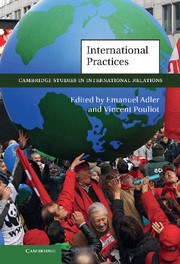Book contents
- Frontmatter
- Contents
- Figure
- Note on the contributors
- Acronyms and abbreviations
- Part I Practices in International Relations and social theory
- Part II Practices and their background
- Part III The evolution of practices
- Part IV Practices in practice
- 9 Banking on power
- 10 The practice of political manipulation
- 11 Performing practices
- 12 Privatization in practice
- Part V Conclusion
- Index
- References
12 - Privatization in practice
power and capital in the field of global security
from Part IV - Practices in practice
Published online by Cambridge University Press: 05 June 2012
- Frontmatter
- Contents
- Figure
- Note on the contributors
- Acronyms and abbreviations
- Part I Practices in International Relations and social theory
- Part II Practices and their background
- Part III The evolution of practices
- Part IV Practices in practice
- 9 Banking on power
- 10 The practice of political manipulation
- 11 Performing practices
- 12 Privatization in practice
- Part V Conclusion
- Index
- References
Summary
The study of international security has traditionally been dominated by a focus on states, their militaries, and their interactions. Traced historically, this reflects a powerful set of practices surrounding modern state formation, including the increasing centralization and identification of security with the state, the concentration of coercive power in the hands of public authorities, and the emergence of a clear distinction between security inside the state and security between states. Over the past three centuries, these practices have become so deeply ingrained that the idea of the state’s monopoly of legitimate violence, and of security as a quintessentially public (and national) good, is almost taken for granted in the modern political imagination, and its eventual achievement has become part of near-teleological visions of state formation and development in the West and beyond.
The recent rebirth of private security seems at first sight to reverse this trajectory, and in this chapter we examine how the ordinary unfolding of security practices have generated and contributed to the emergence of a transnational commercial security sector that is in turn transforming practices of security at a global level. Foregrounding practices, we explore the multiple levels at which aspects of contemporary security are being reconfigured by the tremendous expansion in the activities of private security companies (PSCs) in non-militarized, everyday security activities. We argue that the growth and influence of the private security sector in security governance arises from shifts in social practices that cross traditional “levels of analysis” between the individual, national, and international, and also cut across divides between economics and security. These transformations are giving rise to new structures that link global and local security in novel ways, with significant impacts on the provision of security and the distribution of power in societies across the globe.
- Type
- Chapter
- Information
- International Practices , pp. 310 - 332Publisher: Cambridge University PressPrint publication year: 2011
References
- 11
- Cited by

